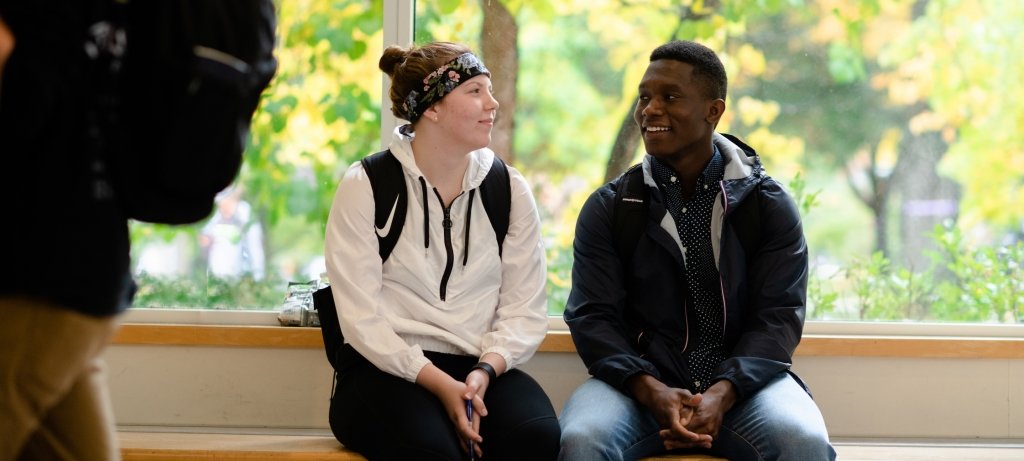“We are for difference: for respecting difference, for allowing difference, for encouraging difference, until difference no longer makes a difference.”
Experiencing diversity is a vital component of a quality engineering education. We prepare our students to live and work in a diverse society, and invite companies and organizations to join us in this effort.
In our increasingly pluralistic and interdependent world, a diversity of talents, perspectives and experiences are essential to generate the solutions for world problems.
Underrepresented minorities and women have made great strides in the competitive field of engineering, but there is still much work to be done. Our goal is to increase the participation of all underrepresented groups in our undergraduate and graduate engineering programs.
We invite you to share your thoughts and ideas on this subject. Please feel free to contact us.
Definitions
The following definitions are derived from the accrediting body for most of the programs offered in the college of engineering, www.abet.org.
Inclusion is the intentional, proactive, and continuing efforts and practices in which all members respect, support, and value others. An inclusive environment provides equitable access to opportunities and resources, empowers everyone to participate equally, and offers respect in words and actions for all.
Diversity is the range of human differences, encompassing the characteristics that make one individual or group different from another. Diversity includes, but is not limited to, the following characteristics: race, ethnicity, culture, gender identity and expression, age, national origin, religious beliefs, work sector, physical ability, sexual orientation, socioeconomic status, education, marital status, language, physical appearance, and cognitive differences.
Equity is the fair treatment, access, opportunity and advancement for all people, achieved by intentional focus on their disparate needs, conditions and abilities. Achieving equity requires understanding of historical and systemic patterns of disparity to address and eliminate barriers, and remove participation gaps as part of a comprehensive strategy to achieve equitable outcomes and social justice.
Campus Resources
The Center for Diversity and Inclusion at Michigan Tech promotes diversity that benefits all students, including ethnic minorities, women, and lesbian, gay, bisexual and transgender students. Through programs, services, mentoring, and development initiatives the Center is committed to strengthening and providing academic, interactive, and cultural experiences to enhance and foster a shared sense of community. The Center provides information on scholarships, programs, initiatives, events and employment opportunities.
The Safe Place Program is a campus-wide program that offers a visible message of inclusion, acceptance and support to gay, lesbian, bisexual and transgender (GLBT) people in the University community.
Students at Michigan Tech have many cultural organizations, allowing them to become ambassadors of their ethnicity, create platforms for social interactions, and celebrate diversity through cultural exchange.
The National Society of Black Engineers (NSBE), with more than 35,700 members, is one of the largest student-governed organizations in the country. Founded in 1975, NSBE now includes more than 394 College, Pre-College, and Technical Professional/Alumni chapters in the United States and abroad. NSBE’s mission is to increase the number of culturally responsible black engineers who excel academically, succeed professionally and positively impact the community.
SHPE is the leading social-technical organization whose primary function is to enhance and achieve the potential of Hispanics in engineering, math and science. SHPE has grown to include more than 60 professional and 230 student chapters throughout the United States and Puerto Rico. SHPE opens up a world of opportunity for students, including scholarships, leadership development, internship and job connections, community outreach, mentoring, and networking.
The Society of Women Engineers empowers women to succeed and advance and be recognized for their life-changing contributions and achievements as engineers and leaders. SWE supports the retention, recruitment and advancement of women in engineering and technology through career services, professional development, and networking. Access resources developed for the advancement of collegiate women and the transition to the workforce.
State and National Resources
The King-Chávez-Parks Future Faculty Fellowship Program provides financial support for traditionally underrepresented candidates pursuing faculty teaching careers in postsecondary education, especially in the STEM fields. A Master’s recipient can receive a maximum of $20,000 towards their degree and a doctoral student can receive a maximum of $35,000 towards their degree.
Five major research universities in the state of Michigan in the Alliance for Graduate Education and the Professoriate. The goal: to advance under-represented minority students in the fields of science, technology, engineering and mathematics (STEM) as they pursue graduate degrees. This alliance includes the graduate schools at the University of Michigan, Michigan State University, Michigan Technological University, Wayne State University, and Western Michigan University.
NACME is the nation’s largest private provider of scholarships for underrepresented minority students in engineering, as well as a leading source of research results and policy analysis regarding the participation of African Americans, Latinos and American Indians in engineering education and careers.
The mission of The National GEM Consortium is to enhance the value of the nation's human capital by increasing the participation of underrepresented groups at the master's and doctoral levels in engineering and science. GEM's signature undergraduate program, called GRAD Lab (Getting Ready for Advanced Degree Laboratory), inspires close to one thousand under-represented undergraduates annually to pursue a graduate degree in engineering or science. GEM's signature graduate program called FFP (Future Faculty and Professionals) provides comprehensive programming to current graduate students to ensure successful completion of rigorous graduate programs. GEM offers MS and PhD Engineering Fellowships.
Women Engineers
Michigan Tech is committed to increasing recruitment and support of women in engineering and other science programs and careers through a long-term, sustained effort. Some strategies include:
We are an ADVANCE institution, receiving NSF funds to support our commitment to increase the participation and advancement of women in STEM fields.
We develop and nurture relationships with potential faculty applicants and research collaborators, bringing experts in various fields to campus.
Middle school girls spend the day exploring the excitement of science and engineering fields each February during the annual Get WISE (Women in Science and Engineering) day at Michigan Tech. The event, coordinated by the Youth Programs office, brings more than 250 sixth, seventh, and eighth graders from 15 local schools to campus for a day of hands-on activities, talks with female role models, and more.
Each summer, Michigan Tech invites academically talented young women to campus to explore ten fields of engineering through hands-on projects and classroom investigations. Middle and high school-age students attend the weeklong program. In summer 2011, participants came from 17 states including: CA, FL, IA, CO, GA, IL, IN, LA, MI, MN, NC, NY, OH, PA, TX, WA and WI. Average GPA: 3.83. Interested in teaching, attending, or volunteering?
Learning Communities are living areas in the residence halls where groups of students with similar interests choose to live, study, and experience Michigan Tech together. The Women In Engineering Learning Community brings together female engineering students and provides support as they pursue careers in the field of engineering. Find out more.

